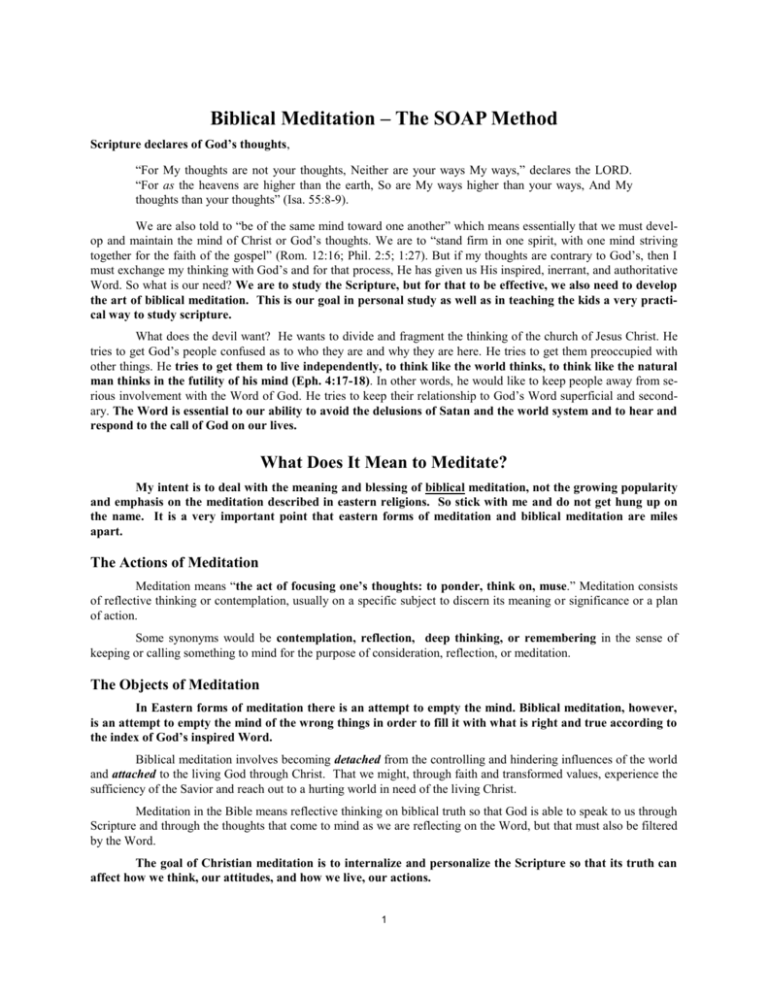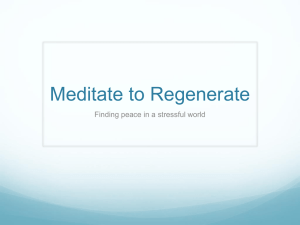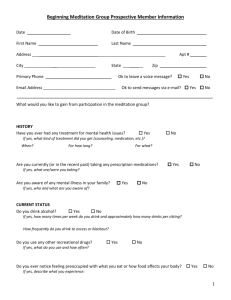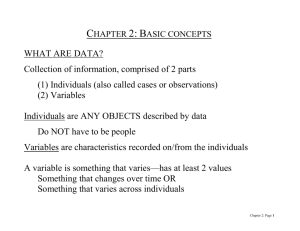The Art of Meditation
advertisement

Biblical Meditation – The SOAP Method Scripture declares of God’s thoughts, “For My thoughts are not your thoughts, Neither are your ways My ways,” declares the LORD. “For as the heavens are higher than the earth, So are My ways higher than your ways, And My thoughts than your thoughts” (Isa. 55:8-9). We are also told to “be of the same mind toward one another” which means essentially that we must develop and maintain the mind of Christ or God’s thoughts. We are to “stand firm in one spirit, with one mind striving together for the faith of the gospel” (Rom. 12:16; Phil. 2:5; 1:27). But if my thoughts are contrary to God’s, then I must exchange my thinking with God’s and for that process, He has given us His inspired, inerrant, and authoritative Word. So what is our need? We are to study the Scripture, but for that to be effective, we also need to develop the art of biblical meditation. This is our goal in personal study as well as in teaching the kids a very practical way to study scripture. What does the devil want? He wants to divide and fragment the thinking of the church of Jesus Christ. He tries to get God’s people confused as to who they are and why they are here. He tries to get them preoccupied with other things. He tries to get them to live independently, to think like the world thinks, to think like the natural man thinks in the futility of his mind (Eph. 4:17-18). In other words, he would like to keep people away from serious involvement with the Word of God. He tries to keep their relationship to God’s Word superficial and secondary. The Word is essential to our ability to avoid the delusions of Satan and the world system and to hear and respond to the call of God on our lives. What Does It Mean to Meditate? My intent is to deal with the meaning and blessing of biblical meditation, not the growing popularity and emphasis on the meditation described in eastern religions. So stick with me and do not get hung up on the name. It is a very important point that eastern forms of meditation and biblical meditation are miles apart. The Actions of Meditation Meditation means “the act of focusing one’s thoughts: to ponder, think on, muse.” Meditation consists of reflective thinking or contemplation, usually on a specific subject to discern its meaning or significance or a plan of action. Some synonyms would be contemplation, reflection, deep thinking, or remembering in the sense of keeping or calling something to mind for the purpose of consideration, reflection, or meditation. The Objects of Meditation In Eastern forms of meditation there is an attempt to empty the mind. Biblical meditation, however, is an attempt to empty the mind of the wrong things in order to fill it with what is right and true according to the index of God’s inspired Word. Biblical meditation involves becoming detached from the controlling and hindering influences of the world and attached to the living God through Christ. That we might, through faith and transformed values, experience the sufficiency of the Savior and reach out to a hurting world in need of the living Christ. Meditation in the Bible means reflective thinking on biblical truth so that God is able to speak to us through Scripture and through the thoughts that come to mind as we are reflecting on the Word, but that must also be filtered by the Word. The goal of Christian meditation is to internalize and personalize the Scripture so that its truth can affect how we think, our attitudes, and how we live, our actions. 1 The Objectives of Meditation (1) Worship—It is designed to focus on the Lord and His works (Ps. 27:4; 77:12). It is a place and space in our lives for communion with God. It is a means of elevating the spiritual over the material world and the world of activity: the world of hustle and bustle and coming and going. (2) Instruction—It is designed to improve our understanding of the Word and God’s ways as it applies to our lives (Ps. 49:3 [i.e., understanding comes from the meditations of his heart]; 119:27, 97f). In meditation we exchange our thoughts with God's. (3) Motivation or Encouragement—It is designed to motivate and inspire us in service and courage for the works God has called us to do (Josh. 1:7-8) (4) Transformation—It is designed to transform and change our lives. This would apply to all the above (Ps. 4:4; 19:14; 119:15; Rom. 12:2; Col. 3:1f). Why Should We Meditate? (1) Because of what the Bible is—Revelation from God. In the Bible God has spoken and through this book God reveals Himself, reveals who and what man is, and what His plan for man consists of. (Cf. Ps. 19:7f; 2 Tim. 3:16; 2 Pet. 1:20-21; Isa. 55:8f.) The Bible was given to us by God to be read and meditated on. “An unread Bible is like food that is refused, an unopened love letter, a buried sword, a road map not studied, a gold mine not worked.”1 (2) Because of what man is and needs—Reconciliation to God and one another. The nature of man and the nature of the world and Satan constitutes a great need for personalizing the Word: cf. Eph. 4:16f; 5:15f; 2 Cor. 4:4; etc. Because man is a holistic being, his spiritual, psychological, and physical faculties are complexly intertwined. Dr. Paul Meier writes: (3) Because of what the meditation does—Reformation of the mind and life. Using the words “meditate” and “remember” which is sometimes used as a synonym for meditate (Ps. 63:6; 77:5-7; 119:55-56; 143:5-6), let’s note from Scripture some of the reasons we should meditate on the Word. The Art of Meditation Biblical meditation involves the whole process of reading and observing a portion of Scripture in order to seek both its meaning and application. Though we generally think in terms of the final aspect in which one reflects on his observations and understanding of a particular text or concept of the Word, reading the text of Scripture reflectively is a part of the process of biblical meditation. There are three things that must go together in biblical meditation: READING, REFLECTING, and RESPONDING. The ultimate purpose of these three are the three great purposes of Bible study: OBSERVATION/INTERPRETATION—What does the text say and mean? APPLICATION—How does the text apply to my life? Scripture-Reading Careful reading for observation comes first. The word “read” or “reading” occurs 80 times in Scripture, 34 times in the New Testament. This involves the following: (1) Read Reverently, ever mindful that you are reading the Word of God. The Bible is God breathed and each word and sentence has a purpose and function. This means reading deliberately, slowly, and alertly, not mechanically or legalistically. 1 Irving L. Jensen, How to Profit From Reading the Bible, Moody Press, Chicago, 1985, p. ix. 2 (2) Read Repeatedly, going over and over the passage to observe more and more knowing that you do not exhaust the meaning of any verse even when it becomes familiar and you think you know it. There are always new observations to be seen or mined as a miner searches for silver or gold (Prov. 2:4). Do not allow yourselves or the kids to skip reading the passage because the person next to them just read it. (3) Read Creatively, visualizing yourself in the time, history, and situation of the passage as much as possible to experience a feel for what the author and the people of his day were experiencing. “Precisely because God chose to speak in the context of real human history, we may take courage that these same words will speak again and again in our own ‘real’ history, as they have throughout the history of the church.”2 (4) Read to Understand, purposely, to make observations of the text that will help you understand its meaning. This means asking questions like our six important friends in Bible study, who, what, when, where, why, and how. Of course, such reading requires constant reflection and pondering over the text you are reading. This brings us to our next point in the process of meditation, reflection. Observation - Reflection Irving Jensen writes, “Reflection is the mind and heart at work, thinking over and concentrating on what the eyes have seen … Reflection in Bible reading should have the intensity of meditation, whereby the soul has the desire and intention of obeying God’s Word.”3 So, how can we read the Bible like this? Jensen suggest the following which I have summarized as follows: (1) Reflect Purposely, to fulfill the biblical objectives of meditation—worship, instruction, motivation, transformation. As the Psalmist who prayed: “I will meditate on Thy precepts, and regard Thy ways” (Psa. 119:15), and again, “Make me to understand the way of Thy precepts, So I will meditate on Thy wonders” (vs. 27). (2) Reflect Imaginatively, visualize the setting and put yourself there. Try to feel the burden, the concern, the fear, the love, etc. Seek to taste and feel every word you read. (3) Reflect Humbly, realizing that you are not reading just a book, but that which is the very Word from God, God-breathed and authoritative, alive and powerful. It should truly humble us to know that in the Bible, the Holy One who is also the Almighty One, has spoken to us in the Bible. (4) Reflect Prayerfully, trusting the Spirit of God to open up your eyes and heart to see, understand, and respond to the Word. Again, read as the Psalmist who prayed: “Open my eyes that I may behold wonderful things from Thy law” (Ps. 119:18). This is also the position of humility and respect. God’s Word is a spiritual book requiring spiritual perception. (5) Reflect Patiently but expectantly, waiting on the Lord to teach you and show you. Time and patience are important elements to effective meditation and examination of the Word. Again remember that the great enemies of meditating on the Word are noise, hurry, and crowds. Thus, the Psalmist, looking for insight to God’s Word and direction in his life prayed, “Lead me in Thy truth and teach me, For Thou art the God of my salvation; For Thee I wait all the day” (Ps. 25:5). Concluding his section on reflection, Jensen writes: The purpose of reading and reflecting on Scripture is response, responding and applying the passage to our own lives. So we naturally turn to the third aspect of meditation and the ultimate purpose of the Word. The call to reflection in Bible reading is expressed in Samuel’s plain words to Saul, “Stand here thou still a while, that I may shew thee the word of God” (1 Samuel 9:27, KJV).4 2 Gordon D. Fee and Douglas Stuart, How to Read the Bible for All Its Worth, Zondervan, Grand Rapids, 1993, p. 20. 3 Jensen, p. 48. 4 Ibid., p. 52. 3 Application-Responding Responding is the process whereby we make personal application of our observations and understanding of the text. Through meditation we internalize that we may personalize. (1) The focal point of application: You are the focal point in application. This is not selfish or selfcentered. 2 Tim. 3:16 makes this clear. You are meditating on the Word as part of your search for spiritual help, direction, and food. The Bible is addressed to each of us personally. (2) Important questions for application: How does this truth apply to my life in four spheres: in my personal life, in my family, at school/work, in my church, and in my neighborhood? In view of this truth, what specific changes should I make in my life? In other words, am I applying this truth? If not why not? Was it ignorance, rebellion, indifference? How do I propose to carry out these changes? We need to be specific here. (3) Three vital responses for application: First, the response of confession: The Word of God is like a sword (it penetrates), like a mirror (it reveals), and like a critic of the heart (it judges and reproves or exposes our attitudes and actions). Whenever we read the Word, it should be with an open heart that is ready to acknowledge sin and confess it. So David prayed, “Search me, O God, and know my heart; try me, and know my ways, and see if there be any wicked way within me” (Ps. 139:23-24a; cf. 1 John 1:7-9; “walking in the light”). Proverbs 28:13 He who conceals his transgressions will not prosper, But he who confesses and forsakes them will find compassion. Second, the response of faith: One of our reasons for meditating on the Word is to develop and build our faith. “Faith comes by hearing and hearing by the Word of God,” (Romans 10:17 brick by brick). We must mix faith with what we read and hear. In other words, we must act by faith in what God has shown us from His Word or our hearts can become hardened (cf. Mk. 6 and Heb. 3:7f). Hebrews 4:2 For indeed we have had good news preached to us, just as they also; but the word they heard did not profit them, because it was not united by faith in those who heard. Third, the response of obedience: When we obey the Word we are demonstrating the reality of our love for the Lord and how much we really believe what we have seen and learned. It demonstrates our faith and just how serious we are in our relationship with Jesus Christ. 1 Sam. 15:22-23 And Samuel said, “Has the LORD as much delight in burnt offerings and sacrifices As in obeying the voice of the LORD? Behold, to obey is better than sacrifice, And to heed than the fat of rams. 23 For rebellion is as the sin of divination, And insubordination is as iniquity and idolatry. Because you have rejected the word of the LORD, He has also rejected you from being king.” In his book, Pathways to Power, a book written in the early 1950s, Dr. Unger wrote: Meditation upon God’s Word is fast becoming a lost art among many Christian people. This holy exercise of pondering over the Word, chewing it as an animal chews its cud to get its sweetness and nutritive virtue into the heart and life, takes time, which ill fits into the speed of our modern age. Today most Christians’ devotions are too hurried, their lives too rushed. 5 If that was true in the early fifties, how much more is it not true today—forty years later in an age that has become even more activity oriented, materialistic, and consumer minded. Do we want this trend to continue to decline with our childred? 5 Merril F. Unger, Pathways to Power, Zondervan, Grand Rapids, 1953, p. 41. 4 Take some time to try it out: 1 John 3 (S) Scripture: Write the verse that God would have you understand better and put into action (O) Observation: In a few sentences, write what the verse said and meant and why that spoke to you (A) Application/Action: How does this verse apply to you within your four spheres and is there a change that needs to be made or an action that needs to be reinforced (P) Prayer: Write a short prayer that agrees with what God spoke to you 1 See what kind of love the Father has given to us, that we should be called children of God; and so we are. The reason why the world does not know us is that it did not know him. 2 Beloved, we are God's children now, and what we will be has not yet appeared; but we know that when he appears[a] we shall be like him, because we shall see him as he is. 3 And everyone who thus hopes in him purifies himself as he is pure. 4 Everyone who makes a practice of sinning also practices lawlessness; sin is lawlessness. 5 You know that he appeared in order to take away sins, and in him there is no sin. 6 No one who abides in him keeps on sinning; no one who keeps on sinning has either seen him or known him. 7 Little children, let no one deceive you. Whoever practices righteousness is righteous, as he is righteous. 8 Whoever makes a practice of sinning is of the devil, for the devil has been sinning from the beginning. The reason the Son of God appeared was to destroy the works of the devil. 9 No one born of God makes a practice of sinning, for God's[b] seed abides in him, and he cannot keep on sinning because he has been born of God. 10 By this it is evident who are the children of God, and who are the children of the devil: whoever does not practice righteousness is not of God, nor is the one who does not love his brother. 11 For this is the message that you have heard from the beginning, that we should love one another. 12 We should not be like Cain, who was of the evil one and murdered his brother. And why did he murder him? Because his own deeds were evil and his brother's righteous. 13 Do not be surprised, brothers,[c] that the world hates you. 14 We know that we have passed out of death into life, because we love the brothers. Whoever does not love abides in death. 15 Everyone who hates his brother is a murderer, and you know that no murderer has eternal life abiding in him. 16 By this we know love, that he laid down his life for us, and we ought to lay down our lives for the brothers. 17 But if anyone has the world's goods and sees his brother in need, yet closes his heart against him, how does God's love abide in him? 18 Little children, let us not love in word or talk but in deed and in truth. 19 By this we shall know that we are of the truth and reassure our heart before him; 20 for whenever our heart condemns us, God is greater than our heart, and he knows everything. 21 Beloved, if our heart does not condemn us, we have confidence before God; 22 and whatever we ask we receive from him, because we keep his commandments and do what pleases him. 23 And this is his commandment, that we believe in the name of his Son Jesus Christ and love one another, just as he has commanded us. 24 Whoever keeps his commandments abides in God,[d] and God[e] in him. And by this we know that he abides in us, by the Spirit whom he has given us. 5






